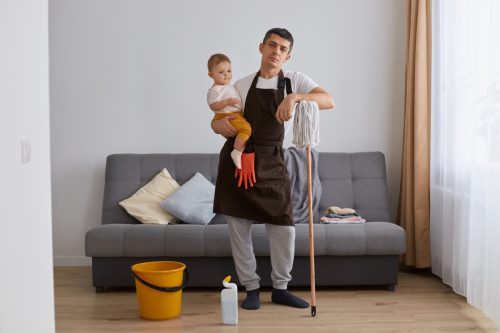Not Doing This Together May Be Ruining Your Relationship, New Study Warns

From going on regular dates to taking the time to have important conversations, there are a number of things you and your partner can do together to build a solid foundation for your relationship. But it’s also important to take note of the things you’re not sharing, as doing some activities separately could spell trouble for your future. In fact, a new study has found that you and your partner not doing one thing together could be ruining your relationship. Read on to find out if this is an issue you need to fix.
READ THIS NEXT: If You and Your Partner Can’t Agree on This, It’s Time to Break Up.
Many couples think splitting up household chores equally is important for a relationship.

When it comes to doing household chores, a majority of couples believe it’s important to split up tasks fairly—even if that’s not what ends up happening. Roborocks, a home robotics company, commissioned a survey in Feb. 2022 where they polled 2,000 U.S. adults who live with a significant other to get a sense of how people feel about the division of household chores.
According to the survey, 53 percent of respondents said they consider equal chore responsibilities to be just as important to the health of their relationship as their sex life. And 50 percent said they think not helping with chores is just as bad—or even worse than—cheating on your partner. But when it comes down to it, not everyone is putting their money where their mouth is. Only 9 percent of the respondents said their partner always completes their split of the chores, while 34 percent of couples said they believe their significant other has purposefully done chores poorly to avoid having to do them in the future.
But not sharing any of your chores could be hurting your relationship.

You might want to rethink the idea of splitting chores altogether, as it turns out—even if you are dividing them up 50/50. A new study published April 27 in the journal Sex Roles has found that sharing household chores may be much more important in a relationship than splitting these tasks. Study author Daniel Carlson, PhD, an associate professor in the Department of Family and Consumer Studies at the University of Utah, analyzed the ’90s U.S. National Survey of Families and Households and the 2006 Marital and Relationship Survey and found trends related to the division of housework and relationship satisfaction.
According to the study, the number of equally shared tasks played a huge role in positive relationships. Couples who did not share any chores—and instead each took on specific tasks—were not as satisfied with their relationship as couples who shared at least three chores. “The number of equally shared tasks matters a great deal for both men’s and women’s relationship quality,” Carlson wrote in a brief for the study. “Indeed, among recent cohorts there is evidence to suggest that it matters as much if not more than each partner’s overall proportion of housework.”
For more relationship advice delivered straight to your inbox, sign up for our daily newsletter.
Perceived fairness is a huge factor in this.

In an interview with Time magazine, Carlson said that one of the “biggest predictors of satisfaction” in a relationship is the feeling of fairness that both people have. “Those who were equally sharing all the tasks, 99 percent reported that their relationship was fair,” he noted. “Those who had 50/50 housework, but they didn’t share any tasks together? Only half of them thought their relationship was fair.”
The difference in perceived fairness from sharing versus splitting chores is largely the result of how onerous or enjoyable people find certain tasks to be. “Some are more enjoyable than others. Some are more isolating than others. If I get to go through the grocery shopping, I get to go out of the house, I get to interact with people, potentially, as opposed to sitting on my knees, cleaning the toilet,” Carlson explained.
So even if you’re both spending the same amount of time on housework or completing the same amount of tasks, the split might not feel fair. “I might get the three easy ones, the more fun ones, and you might get the three harder ones. So even though we’re kind of splitting it up on the surface, when it comes down to it, those tasks are not equivalent,” Carlson told Time. In his brief, he wrote that “sharing all tasks equally eliminates these sources of resentment or misunderstanding, ensuring that each partner feels their arrangement is equitable and satisfying.”
But there could be other reasons why couples are happier sharing tasks.

It doesn’t just come down to what you or your partner feels is fair, however. Carlson also told Time that sharing household chores also helps couples with the feeling of collaboration and togetherness in a relationship—even if they’re not actually doing the tasks at the same exact time. According to Carlson, supplementary analyses of his have found that couples who share chores tend to have better communication skills.
“I could do the laundry on Tuesdays and Thursdays, you could do the laundry on Mondays and Wednesdays, but that requires coordination. That requires communication,” he said. “Good high quality relationships are built on good communication between partners, a sense of togetherness and mutual decision making.”
READ THIS NEXT: Most Couples Stop Being “In Love” After This Long, Experts Say.